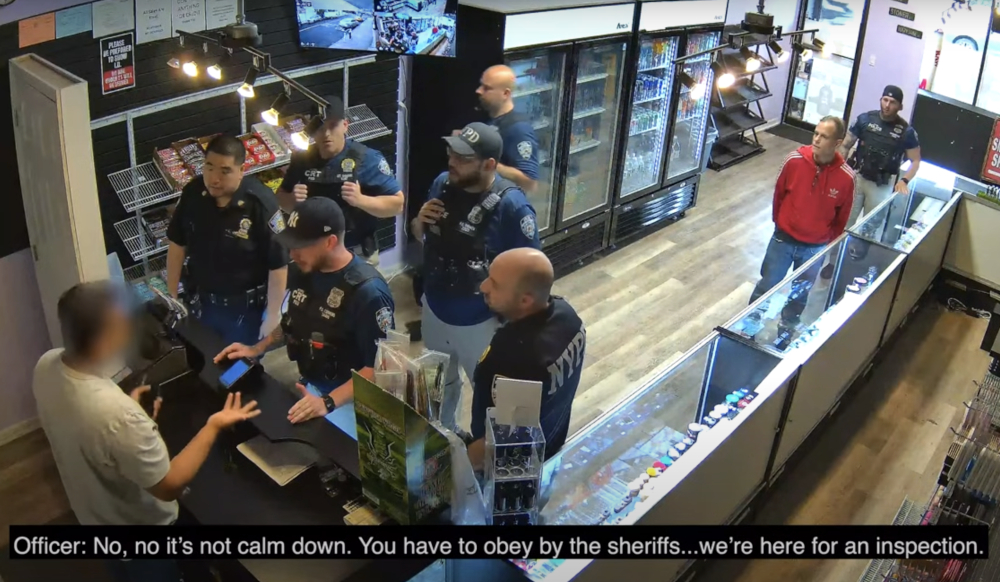Regulators and law enforcement agencies in New York and Texas have stepped up enforcement actions against sellers of intoxicating hemp products with raids this month.
In New York, hundreds of hemp shops have been raided or closed since a statewide crackdown was launched in March after lawmakers in Albany gave new powers to police agencies and the state’s Office of Cannabis Management.
Licensed marijuana retailers in New York have backed the enforcement actions, suggesting the widespread availability of gray-market intoxicating hemp products is jeopardizing the state’s nascent legal pot market, estimated at $500 million to $1 billion.
New York State legalized recreational marijuana in 2021, and the first licensed dispensaries began opening in late 2022, but a number of challenges have made the implementation of the state’s program more complicated than initially anticipated – most notably the emergence of the hemp-derived substances made possible by a loophole in federal law.
Challenge nationwide
States throughout the U.S. are working to get their arms around a runaway market for intoxicating hemp products – often called “diet weed,” “marijuana light,” or “gas station pot,” – after the 2018 Farm Bill legalized industrial hemp federally but failed to anticipate the market for intoxicating downstream products that has developed in the intervening years.
Most of the substances are produced synthetically by putting hemp-derived CBD through a process in the lab. In addition to delta-8 THC – the most popular of the compounds – producers are also making synthetic delta-10 THC, THC-O-acetate, HHC, THCP and others.
In addition to being widely available in licensed CBD outlets and hemp shops, the products can also be found in convenience stores, bodegas, and other common retail outlets. Online ads also push the products, which are usually in the form of gummies and other edibles.
Gov. Kathy Hochul, New York City Mayor Eric Adams and other officials say the raids have helped increase sales through regulated marijuana operators.
Retailers push back
Three licensed hemp retailers – Smoke N Save in Saratoga Springs, Two Strains in Queensbury, and Breckenridge in Manhattan – earlier this week filed a lawsuit in state Supreme Court against the OCM and the New York City Sheriff’s Office, claiming the police actions are taking place without lab tests or confirmation of what’s actually in the products.
The crackdown on New York’s illicit cannabis trade also has had an “immediate and catastrophic effect” on the market for CBD, which has “essentially halted,” a group of hemp companies charged in a separate lawsuit filed in March against the OCM and the New York Cannabis Control Board.
9 shops hit in Texas
In Texas, the Police Department in the city of Allen (APD) joined agents of the U.S. Drug Enforcement Administration in a more concentrated action against nine local vape and CBD shops that were accused of selling products containing intoxicating hemp substances.
Texas has more than 7,700 operators licensed to sell hemp products at retail, according to the Department of State Health Services (DSHS).
The Texas raids were foreshadowed by warning letters sent to the shop owners three months ago by the APD, which identified several “hemp” products as over the legal limit for THC. The police told the The Dallas Morning News that products sold by local businesses had tested from 7% to 78% THC.
Products remain ‘legal’
Hemp stakeholders have have had some success in pushing back against restrictions on the products.
In 2021 a bill that would have outlawed the products died in the legislature, and last year operators won a court case that set aside a ban on the products by the DSHS, which had designated the THC compounds inside them as Schedule 1 controlled substances.
The Senate State Affairs Committee held an interim hearing in late July during which lawmakers called for a review of the hemp intoxicants when the Legislature convenes next year.
Medical marijuana is legal in Texas but recreational pot faces an uphill battle as lawmakers have repeatedly spurned legalization efforts.

